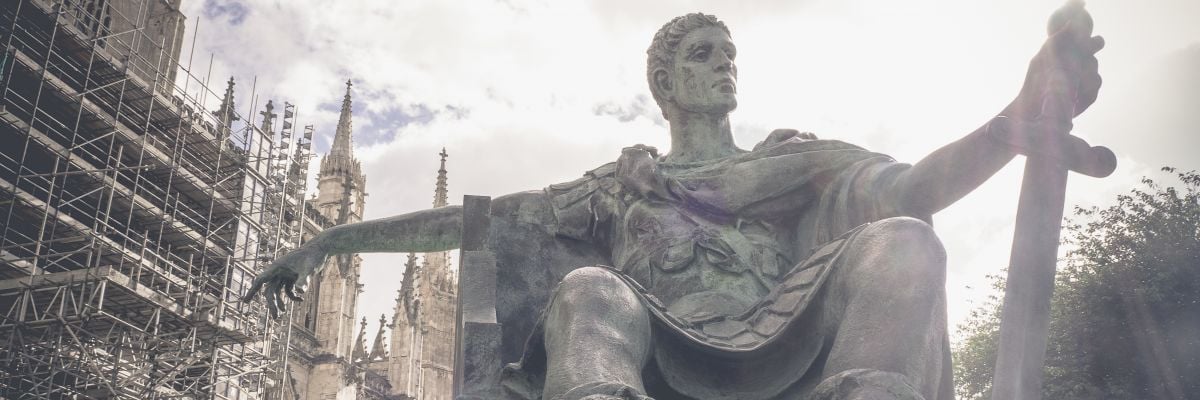
I’m sure you’ve heard the phrase “beating a dead horse.” It refers to something that has been said or done so many times that it has outlived its usefulness. This is especially true of arguments that are not only old but also untrue.
Like the proverbial horse, the Roman emperor Constantine has been beaten to death by anti-Catholics.
I make it a point to check all of the comments posted on our YouTube and Facebook pages at least twice a day. As sure as fish live in water, I have come to expect at least one message a day from a Christian Fundamentalist about how the Catholic Church was founded by Emperor Constantine sometime in the fourth century.
It’s almost unfathomable to me that in this day and age Fundamentalists still have not learned to verify the validity of their anti-Catholic arguments. But then again, with so many websites making claims like “Constantine founded the Catholic Church” living on in cyberspace, it’s no wonder some folks still cling to what blogger Mark Shea refers to as “pseudo knowledge.”
It would be nice if this falsity were confined to Fundamentalist circles, but sadly it is not. As atheist podcast host and blogger David Smalley explains on his website:
The Bible was ‘canonized’ around 325 C.E. (about 275+ years after Jesus’ death) with Constantine in charge. . . . At the time Constantine was overseeing the canonization or ‘building’ of the Bible, if he didn’t agree with the text, it was thrown out. There are tons of ‘scriptures’ that did not make it in. A quick research on the Council of Nicaea will prove this.
There’s no doubt that Constantine was favorable to Christianity. Still, many people mistakenly believe that he not only favored it but that he made it the state religion. He did not. He signed the Edict of Milan, which made it legal to practice Christianity and ordered that the Christians’ confiscated property be returned to them.
Another mistaken notion is that Constantine exercised complete control over the First Council of Nicaea in 325. The primary reason for the council was due to the growing Arian heresy. Jimmy Akin summarizes Arianism this way:
[Arianism was] founded by Arius, a priest of Alexandria, Egypt, in the early 300s. Arius held that originally the Son of God did not exist. There was a time in which there was a single divine Person who became the Father when he created the Son out of nothing. The Son was the first of all created beings and thus separate from the Father in beginning. The heresy was condemned at the first ecumenical council—Nicaea I in 325—but the controversy intensified and lasted much longer (The Fathers Know Best, p. 85).
Constantine did not fully understand why Arianism was so controversial, and he even endorsed many of Arius’s ideas. Historian Dr. James Hitchcock explains:
[W]hen Constantine also endorsed Arius’s ideas, there was an uproar that led the emperor in 325 to call the Council of Nicaea (Asia Minor) to settle the issue. After an intense struggle, the Council condemned Arius, declaring the Son to be “consubstantial” with the Father, that is, sharing the same substance (History of the Catholic Church, p. 83).
If Constantine held as much sway over the Council as many claim, then it is a peculiar thing that the Christology he favored was the big loser.
The next anti-Catholic claim is summarized in Mr. Smalley’s quote above: It is the idea that Constantine decided which books belonged in the Bible and that the ones he did not favor were left out.
The Council Fathers discussed many things besides Arianism, including the proper dating of Easter, the validity of baptisms administered by heretics, and more. One issue they did not discuss, however, is which books belonged in the Bible. They drafted a list of canons (ecclesiastical laws) that you can read for yourself here.
Mr. Smalley’s assertion that “quick research on the Council of Nicaea” will prove his claim in fact proves otherwise; unless, of course, you are getting your information from anti-Catholic websites that don’t provide any primary sources to back them up.
Finally, there is the claim that Constantine introduced pagan elements into what was “pure” Christianity up to that point. Many Fundamentalists will claim that doctrines like transubstantiation, the communion of saints, or the sacrifice of the Mass were pagan ideas. But all of these teachings and more can be traced back to the time of the Apostles through the writings of the early Christians.
To counter this claim, I highly recommend Jimmy Akin’s book, The Fathers Know Best: Your Essential Guide to the Teachings of the Early Christians, available from Catholic Answers. I also recommend getting a copy of the May-June 2013 issue of Catholic Answers Magazine, in which I tackle several of the supposed pagan parallels to Catholic practices.



